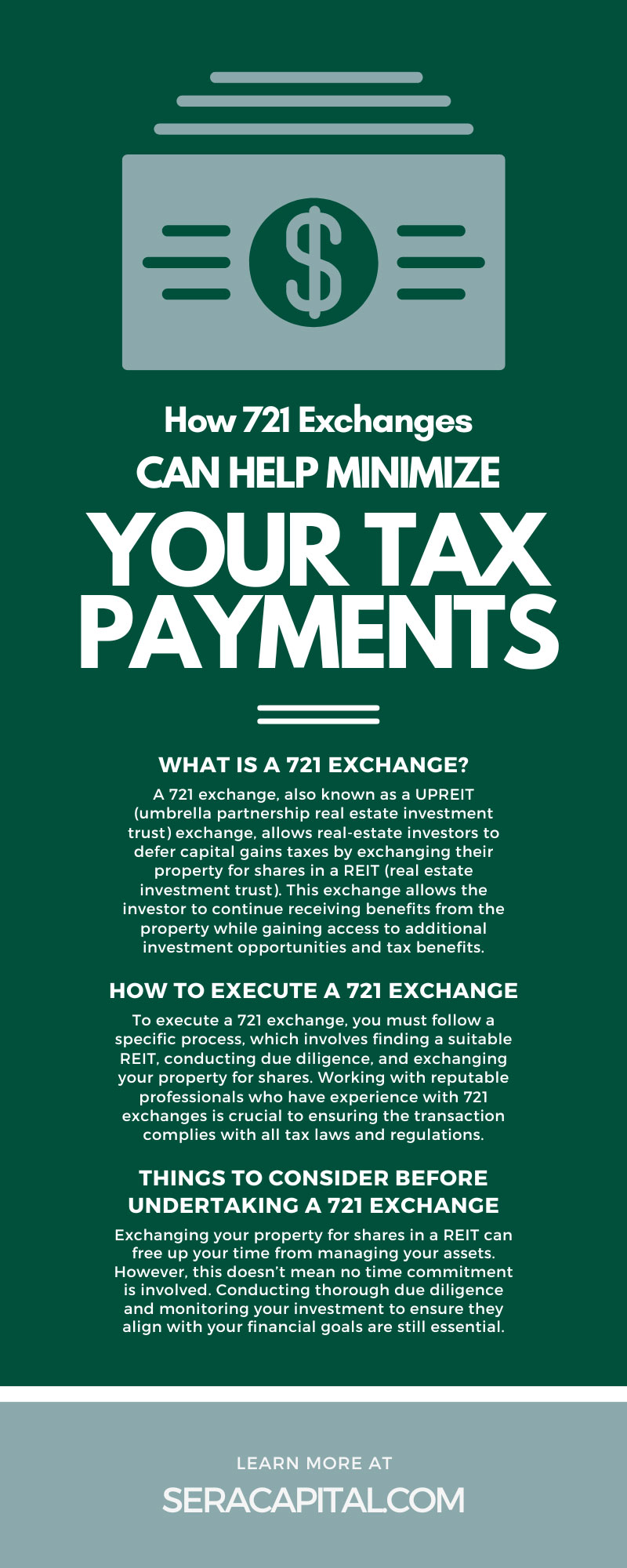How 721 Exchanges Can Help Minimize Your Tax Payments

Carl E. Sera, CMT
January 31, 2024
As a real estate investor, you may already be familiar with capital gains. These are taxes levied on profits from selling an asset such as a property. Capital gains taxes can be significant expenses, but there is a way to significantly reduce or even defer them: through a 721 exchange.
What Is a 721 Exchange?
A 721 exchange, also known as a UPREIT (umbrella partnership real estate investment trust) exchange, allows real-estate investors to defer capital gains taxes by exchanging their property for shares in a REIT (real estate investment trust). This exchange allows the investor to continue receiving benefits from the property while gaining access to additional investment opportunities and tax benefits.
Benefits of a 721 Exchange
There are several key benefits of utilizing a 721 exchange as a real-estate investor:
Tax Deferral
The most significant advantage of a 721 exchange is the ability to defer capital gains taxes. By exchanging your property for shares in a REIT, you are not technically selling your asset and, therefore, can delay paying taxes on the gains. This deferral allows you to continue investing with more capital and potentially increase your returns.
Diversification
By exchanging your property for shares in a REIT, you gain access to a diverse portfolio of properties, reducing your investment risk. Additionally, depending on the type of REIT, you may also have exposure to other asset classes, such as commercial or industrial properties.
Increased Liquidity
Real estate is an illiquid asset, so selling it quickly can be a challenge. By exchanging your property for shares in a REIT, you gain access to a more liquid investment vehicle that can be bought and sold on the stock market.
Professional Management
Experienced teams professionally manage REITs, giving you peace of mind and freeing up your time to focus on other investments or personal endeavors.
Higher Return Potential
REITs typically provide higher returns than traditional real estate investments do, making them attractive options for investors looking to grow their wealth.
How To Execute a 721 Exchange
To execute a 721 exchange, you must follow a specific process, which involves finding a suitable REIT, conducting due diligence, and exchanging your property for shares. Working with reputable professionals who have experience with 721 exchanges is crucial to ensuring the transaction complies with all tax laws and regulations.
The Importance of Hiring an Advisor
Executing a 721 exchange can be complex, with numerous legal and financial considerations to bear in mind. This is why the expertise of a financial advisor is vital. Engaging a knowledgeable advisor during a 721 exchange can have several key benefits:
- Professional guidance: Navigating the intricacies of a 721 exchange can be challenging. A seasoned advisor will have the experience and knowledge to guide you through the process, helping you understand each step and make informed decisions.
- Risk mitigation: Missteps during the exchange process can result in hefty penalties or unintended tax liabilities. Advisors are well-versed in tax laws and regulations related to 721 exchanges, ensuring compliance and mitigating potential risks.
- Negotiation skills: Advisors can use their industry knowledge and negotiation skills to ensure you receive a fair deal when exchanging your property for REIT shares.
- Time and stress reduction: Coordinating an exchange can be time-consuming and stressful. By hiring a professional advisor, you can delegate these tasks, saving yourself time and minimizing stress.
- Future financial planning: An advisor can help you strategically plan for future investments and tax obligations, integrating your 721 exchange into your overall financial plan.
Executing a 721 exchange independently is technically possible, but hiring an experienced financial advisor will allow you to navigate the process more confidently and efficiently. Their expertise can pay off exponentially, not just in potential tax savings but also in terms of peace of mind and future financial stability.
Things To Consider Before Undertaking a 721 Exchange
Utilizing a 721 exchange offers significant benefits, but there are also some considerations to keep in mind before you pursue this type of transaction:
Tax Implications
A 721 tax-deferred exchange allows you to defer capital gains taxes, but understanding that the tax liability does not disappear entirely is essential. When you eventually sell your shares in the REIT, you must pay those deferred taxes.
Investment Risk
There’s always a level of risk involved with any investment. REITs typically provide stable, consistent returns, but they’re still subject to market fluctuations and economic conditions.
Time Commitment
As we mentioned earlier, exchanging your property for shares in a REIT can free up your time from managing your assets. However, this doesn’t mean no time commitment is involved. Conducting thorough due diligence and monitoring your investment to ensure they align with your financial goals are still essential.
Investment Objectives
Before you pursue a 721 exchange, you must evaluate your investment objectives. This option may not be in your favor if you’re looking for quick returns or short-term investments.
Potential Drawbacks of 721 Exchanges
While 721 exchanges offer a multitude of benefits for real-estate investors, understanding the potential downsides before engaging in such a transaction is crucial.
- Limited control: When you enter a UPREIT, you relinquish control over your original property. The REIT’s management team assumes control, and your influence is limited to your voting rights as a shareholder.
- Market risk: Investing in a REIT exposes you to market risk. Unlike individual properties, REIT shares can fluctuate in value based on broader market trends and economic factors.
- Tax complexity: A 721 exchange offers the advantage of deferred capital gains tax, but it may also introduce additional tax complexities. The tax implications of REIT dividends can be complex, and understanding how they’ll affect your overall tax situation is essential.
- Liquidity constraints: Despite REITs generally offering more liquidity than direct real-estate investments, you may encounter some limitations. Some UPREITs restrict when and how you can convert the shares into cash.
- Exit strategy: Exiting a UPREIT transaction can be more complex than selling a property outright. When you’re ready to cash out, you might be subject to capital gains tax on the appreciated value of your share of the REIT.
Given these potential drawbacks, you should approach a 721 exchange with careful consideration and detailed analysis. Consulting with financial and tax advisors who are experienced in real estate and REIT investments will ensure your 721 exchange aligns with your long-term investment goals and financial plan.
A 721 exchange can be a valuable tool for real-estate investors looking to minimize their tax payments and diversify their portfolios. However, understanding the process, potential risks, and your investment objectives before you pursie this type of transaction is crucial. As with any significant financial decision, consulting with qualified professionals who can guide you through the process and ensure compliance with all tax laws and regulations is essential. With careful consideration and expert guidance, a 721 exchange can effectively optimize your real estate investments. So if you want to minimize your tax payments and maximize your returns, consider exploring the potential benefits of a 721 exchange.

Categories
Strategize Your Success
